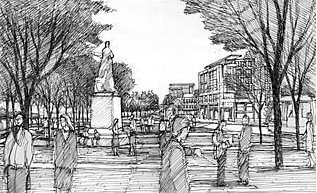Bob Burke has filed
a story about the third meeting of the state Senate task force, known by its acronym of START, that is expected to recommend transportation-related legislation for the 2006 General Assembly. The good news: The group is wrestling with substantive issues. The bad news: It hasn't come anywhere near a consensus, and there's only one more meeting left.
I'd long assumed that Senate Finance Chair John Chichester had set up START to rubber stamp a tax-increase proposal he had waiting in the wings. But that may not be the case. START, chaired by Sen. Charles Hawkins, R-Chatham, is looking at a wide range of issues, not simply ginning up a case for a tax hike. Indeed, the issues the group has identified are so overwhelmingly complex that it is difficult to foresee it developing a meaningful set of recommendations in the time remaining.
From my distant vantage point, it seems as if the Senate is in disarray on the transportation issue. Unless the START hearings are nothing but smoke and mirrors designed to deceive the public -- and they don't seem to be -- it's hard to imagine Senate sentiment coalescing unanimously around a straightforward tax-and-build approach to transportation.
If Chichester tries to take the Senate in that direction, he may well encounter opposition. Over the past two years, he could count on support from Senate Democrats because they, like he, were lined up on the same side of the tax debate as Gov. Mark Warner and against the House. But the dynamics will change with Kaine in the Governor's Mansion. Kaine is not seeking a transportation tax increase -- at least not now. His priorities are tackling the transportation-land use connection and putting transportation funds in a lockbox. Senate Democrats may prove more loyal to him than to Chichester.
In a sign of new Democratic assertiveness, Sen. Edward Houck, D-Spotsylvania, spoke forcefully about land use issues in the recent START hearing. Expect to hear more from Senate Democrats in the upcoming debate. If they align tactically with conservative, low-tax Republicans in the Senate on the transportation-tax issue, Chichester may not enjoy the same control over the Senate as in the past few years. He still may be able to mobilize a majority - but not without a fight. That new reality will undercut his negotiating position with the Governor and the House.
The House of Delegates is playing its legislative cards close to the chest, but Speaker William Howell has made clear his opposition to raising taxes to fund transportation. All things considered, the 2006 session is shaping up as a transportation free for all. Given the governor's power to set the agenda and frame the issues, however, Tim Kaine should enjoy the initiative.

.jpg)

